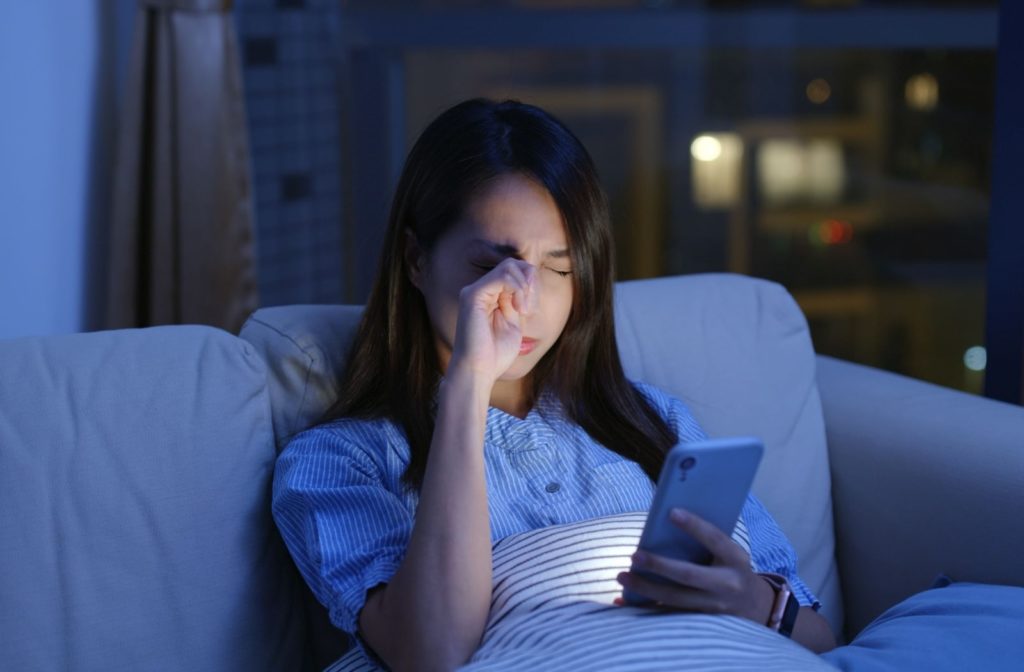We’ve all been there. That annoying itch in your eye that makes you want to rub them raw (but you know you shouldn’t). Itchy eyes can be aggravating, interrupting your day and making it hard to focus.
Many possible factors can contribute to itchy eyes including allergies, digital eye strain, and environmental irritants like smoke. We will explore the common culprits and discuss solutions to get you back to clear, comfortable vision.
Common Causes for Itchy Eyes
There are several causes of itchy eyes, but these are some of the most common:
- Allergens
- Eyestrain
- Dryness
- Infections or Inflammation
- Contact Lens Use
- Environmental Conditions
- Medications
- Nutrition
Allergens
Allergens are the most common contributor to itchy eyes. When your eye comes into contact with an allergen your immune system releases histamines. This histamine release is what leads to the itching, redness, and swelling you experience. To combat this, consider using air purifiers, staying indoors when pollen counts are high, and using allergen-trapping filters in your home to minimize exposure.
Eyestrain
In today’s digital age, our eyes are glued to screens more than ever, leading to digital eyestrain. The strain from staring at a screen for prolonged periods can cause the eyes to dry out, resulting in that itchy feeling that we all know too well. To alleviate this, employ the 20-20-20 rule.
Dryness
Dry eyes are a common cause of itchiness, creating a sensation similar to having sand in your eyes. This dryness stems from inadequate tear production or poor-quality tears that don’t properly moisturize the eye. Dry eyes and itchy eyes go hand in hand in many cases, so the factors that contribute to itchy eyes, are also common causes of dry eyes.
Infections or Inflammation
When it comes to infections or inflammation, such as pink eye, blepharitis (eyelid inflammation), or a stye, our eyes naturally become itchy as part of the immune response to fight off the infection. If you think you may have an infection of the eye, discuss your symptoms with an eye doctor. Some infections can be treated at home, but some may require antibiotics, and it is best to consult a healthcare professional for advice.
Environmental Factors
The environment around us can significantly impact the comfort and health of our eyes. Smoke, chlorine from swimming pools, pollen, and air pollution play a role in exacerbating itchy and irritated eyes. Seasonal changes can also contribute to itchiness, with dry winters and high pollen counts in spring and fall.
Stopping the Itch Before It Starts
Small lifestyle adjustments and being well-prepared can make a difference in keeping your eyes comfortable and itch-free. Here are a few tips that can help prevent eyes from becoming itchy:
- Stay Hydrated: Keeping your body hydrated helps your eyes have enough moisture to combat dryness and irritation.
- Wear Sunglasses Outdoors: Especially during allergy season, sunglasses can act as a physical barrier between your eyes and airborne allergens.
- Follow the 20-20-20 rule: For every 20 minutes spent looking at a screen, look at something 20 feet away for at least 20 seconds to reduce eye strain.
- Maintain Good Hygiene: Regularly clean your eyelids with a gentle cleanser and maintain your contact lenses to protect your tear film.
- Use a Humidifier: Adding moisture to the air can help prevent your eyes from becoming dry and irritated, particularly in drier winter months.
- Fight Allergies: If allergies are the culprit, over-the-counter antihistamines or eye drops can help reduce inflammation and itching.
- Avoid your triggers: If you suspect smoke, dust, pet dander, or other irritants are causing the itch, try removing them from your environment as much as possible by using small area air filters and changing furnace filters regularly.
- Nutrition: Lack of essential nutrients, such as Omega-3 fatty acids, can affect tear quality and lead to dry, itchy eyes.
The Temptation of the Rub
It’s instinctive to rub at your eyes when they start to itch. It can be very challenging to resist the urge, and sometimes we rub without being aware of it. Rubbing your eyes, as satisfying as it may be in the moment, can cause injuries, worsen eye conditions, and spread infection.
Scratching the cornea is easier than you may think and can lead to infections or vision loss. Those with chronic eye conditions like keratoconus or glaucoma can inadvertently exacerbate their symptoms. If you’ve got pink eye, rubbing your eyes can lead to the spread of infection so be sure to wash your hands if you catch yourself.
Safe Alternatives to Eye Rubbing
- A cold compress
- Hydrating eye drops
- A rest/nap
Keeping Your Eyes Happy and Healthy
If your itchy eyes are accompanied by severe pain, light sensitivity, blurred vision, or discharge, it’s important to consult a healthcare professional to rule out any underlying medical conditions. It is recommended to schedule regular eye exams to monitor eye health and prevent discomfort. If your itchiness happens frequently, discuss your symptoms with an optometrist so they can assess your needs and recommend relief.
At Doctors EyeCare Grande Prairie we offer services like our dry eye therapy or help with managing and reducing digital eye strain. If you have been struggling with itchy eyes, please contact us today. If you have any other questions, have a look through our FAQ page.




